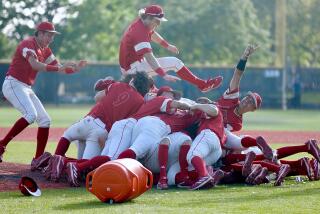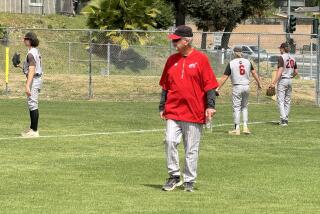HIGHER GROUND : In Conjunction With a Move to a New Campus the Moorpark High Baseball Team Has Relocated From the Cellar to the Tri-Valley Penthouse
- Share via
It is set among equal finery, this diamond gleaming in the mid-afternoon Moorpark sun. To reach it one must wind past grand homes of fresh stucco surrounded by impeccable landscaping, beyond tracts named Mountain Meadows, Foxwood and Shadow Run.
The diamond sits in a corner of the new campus separated from Tierra Rejada Road by a red brick wall, a Ruthian home run from Moorpark High’s spotless buildings. The school opened in the fall and, with 839 students, is at less than half of its capacity. Enrollment is projected to reach 2,000 by the mid 1990s, after the legion of earthmovers in the clearing across the street from the campus have done their work and another 2,500 homes are completed.
Only nine students are needed to make the diamond shine, however. And on a field pristine--from the shiny chain-link backstop to the trash cans painted in school colors--the Musketeers are enjoying unprecedented fortune. Moorpark has never won a baseball title in the 42-year history of the Tri-Valley League but is tied for first now with a 7-2 league record--having already defeated every league opponent at least once--and is 11-3 overall.
The campus that housed the school since 1926 is now a continuation high school, and the old baseball field at the dead end of low-brow High Street sits unused. The varsity and junior-varsity diamonds there are so close together that the center fielders stood back to back and often bumped one another chasing fly balls, to the delight of the transients slumped along the railroad tracks a few yards behind the first-base line.
Try as the Musketeers might, it was difficult getting serious in those surroundings.
“That old field must have been jinxed,” says Robert Hernandez, a 6-foot-3 pitcher-outfielder who serves as a lanky link between the old and new. Hernandez, a junior, started at third base as a freshman and at first as a sophomore, battling the demons of the old field. This year, he is the first certifiable star on the freshly cut diamond, posting a 6-1 record with three saves. He also leads the team with three home runs.
“On the new field, you don’t have to worry about taking a ball in the back of the head when you’re in the outfield,” he says. “And the mound is a lot higher. I like it a lot more. Everybody does.”
Everybody except opposing players, who can no longer count on Moorpark dissolving into a comedy of errors when pressured.
Fourth-year Coach Mario Porto introduced discipline and fundamentals where before there was little of either, but even in his first two seasons, 1986 and ‘87, the Musketeers folded when a victory on the last day of the regular season would have put them in the playoffs.
This year, the Musketeers have exhibited composure, even on the road.
In a game Tuesday at Oak Park, the first Oak Park batter reached base on an infield error, stole second on the next pitch and advanced to third when the throw from the Moorpark catcher skipped into center field. A perfect throw to third by the center fielder appeared to nail the runner, but the third baseman dropped the ball. The runner scored moments later on a wild pitch.
Such a sequence is steeped in Moorpark tradition, but this one had a twist--the Musketeers shook off the embarrassing beginning and went on to win, 12-6, behind two home runs by Hernandez and a tenacious complete-game effort by senior pitcher Keith Orford.
Orford, a bright right-hander who will attend Georgetown, is one of only three seniors who start. Experienced youth is normally an oxymoron on par with Musketeer champions. Yet green and yellow uniforms notwithstanding, these underclassmen are neither inexperienced nor afraid.
Perhaps it could work only in a small league like the 1-A Division Tri-Valley, but Porto was unafraid to pull up freshmen and sophomores to the varsity the past two years. There was only one senior on the roster last season, Kelly Kira, and Porto stationed him in the hazardous center-field position where a player was always one blind-side hit from the disabled list.
“When coach brought me up as a freshman I was shocked,” says shortstop Frank Fernandez, who is batting .536 with 20 stolen bases from his leadoff position. “I was intimidated and overmatched at times. But after three years of doing the same things, nothing takes me by surprise.”
Fernandez, a thick-necked bull of a ballplayer at 5-9, 170 pounds, fully appreciates the team’s prosperity. His father Ernie and brother Ernie Jr. played baseball at Moorpark, the former graduating in 1966 and the latter in 1986.
“It’s a good feeling to do well,” Frank Fernandez says. “I’ve been at a lot of Moorpark games and known a lot of people who went through losing seasons.”
After weathering three seasons and a combined 23-36 record, Porto’s patience is paying dividends. “Those young guys had on-the-job training,” he says. “There were rough days. When the entire infield is sophomores, who do you look to for leadership? Now, they all provide it.”
Porto knows something about perseverance from his own playing days. He mostly rode the bench at Hueneme High before becoming a starting infielder at Ventura College. He went on to start on NCAA Division III national championship teams at Cal State Stanislaus in 1976 and ‘77, then returned to Hueneme as an assistant coach.
“Mario has excellent rapport with kids. He’s able to give and take on a joking level, yet he doesn’t stand for any foolishness,” says Reg Welker, the Hueneme coach who Porto assisted for four years.
Another Porto pusher is Ventura College Coach Gary Anglin.
“I think you have to attribute Moorpark’s turnaround to the philosophy of the coach,” Anglin says. “Mario is even-tempered and consistent. That’s the way his program is.
“He infused some discipline, which was needed over there.”
The guidelines Porto established his first year were, by necessity, appallingly rudimentary. No. 1: Show up to practice. No. 2: Wear a practice uniform; no blue jeans and tennis shoes allowed. No. 3: No yelling at teammates, opponents or umpires.
School administrators have noticed the change.
“I see discipline and punctuality from the kids and the work ethic is very good,” says Moorpark Athletic Director Rich Uphoff, who was the strength and conditioning coach for the high-powered Crespi High football program the past two years. He moved his family to Moorpark and his son Tom, a junior, is the Musketeers’ third baseman.
In more ways than one, conditioning is the product of violating Porto’s rules: He makes the players run so much that they get into condition, plus they become conditioned to follow the rules.
“Baseball practice becomes track practice,” Hernandez says. “One time coming back from a game we got a little out of control and were spitting paper all over the bus. The next day it was 95 degrees but we ran for an hour and a half.”
The team understands, however, that beneath Porto’s sunglasses and Fu Manchu mustache is a guy running alongside them in the dash to the league championship.
“No one questions anything he says but we’re able to have a lot of fun together,” Hernandez says.
And there is nothing more fun for a baseball team than winning, as Moorpark is discovering. On the new campus, the new diamond, anything seems possible.
“Maybe we’re starting a new tradition,” Fernandez says.
More to Read
Get our high school sports newsletter
Prep Rally is devoted to the SoCal high school sports experience, bringing you scores, stories and a behind-the-scenes look at what makes prep sports so popular.
You may occasionally receive promotional content from the Los Angeles Times.







